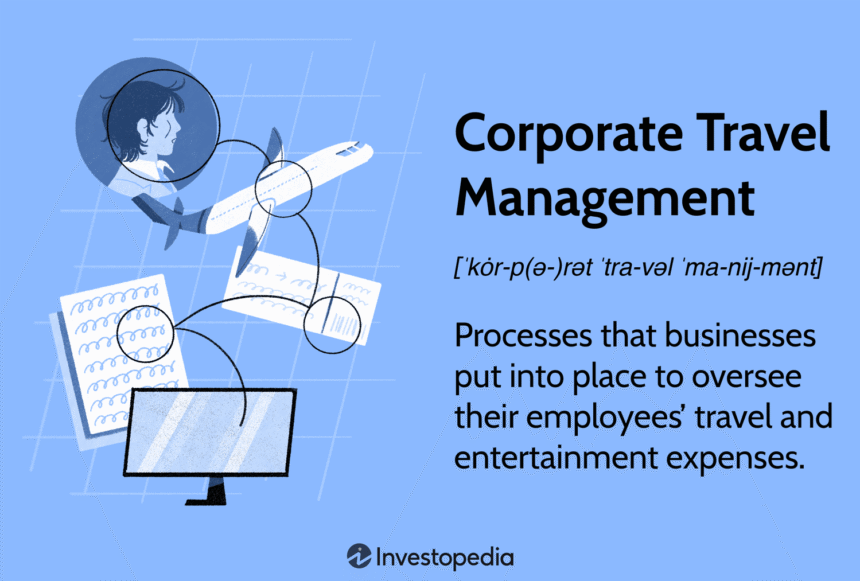In today’s fast-paced business world, corporate travel management is an essential aspect of ensuring that your company’s travel operations run smoothly, efficiently, and cost-effectively. Whether you’re managing travel for a small startup or a large multinational corporation, having a solid corporate travel management plan in place can significantly enhance productivity, reduce costs, and improve overall employee satisfaction.
Corporate travel is not just about booking flights and hotel rooms—it involves a comprehensive approach to organizing travel logistics, managing expenses, and ensuring compliance with company policies. In this ultimate guide to corporate travel management, we will dive deep into the key aspects that can help streamline your business trips and create an optimized, cost-effective, and hassle-free travel experience for your employees.
What is Corporate Travel Management?
Corporate travel management refers to the strategies, tools, and processes involved in organizing and managing travel for business purposes. This includes booking flights, accommodation, transportation, handling travel expenses, and ensuring that travel complies with company policies. The goal of corporate travel management is to ensure that business trips are executed as efficiently and cost-effectively as possible, while also ensuring that employees are comfortable and safe during their travels.
Effective corporate travel management not only helps companies reduce travel expenses but also boosts productivity and ensures that employees can focus on their work without the stress of navigating travel logistics. By managing travel effectively, companies can also track expenses, improve travel experiences, and increase overall business performance.
The Benefits of Streamlined Corporate Travel Management
1. Cost Savings
One of the primary goals of corporate travel management is to reduce travel-related expenses. With a well-organized approach, companies can negotiate better deals with airlines, hotels, and rental car services, ensuring that travel costs are kept under control. Furthermore, implementing corporate travel policies that encourage employees to book in advance or choose more economical options can also help save money in the long run.
2. Time Efficiency
Effective corporate travel management saves valuable time for both the company and its employees. By using automated booking systems, travel managers can quickly secure flights, accommodations, and transportation. This allows employees to focus on the purpose of their trip rather than spending time on the logistics of organizing their travel.
Additionally, corporate travel management tools often come with real-time tracking features, enabling employees to access flight updates, booking details, and any changes in their travel schedule. This streamlines the overall travel process and reduces the amount of time spent on travel-related tasks.
3. Increased Productivity
When business travel is managed well, employees are less likely to experience stress and confusion. With clear travel policies, pre-approved itineraries, and streamlined booking processes, employees can focus more on their work and less on logistical issues. This leads to higher productivity, both during and after the trip.
Moreover, corporate travel management systems often offer tools for expense reporting and budgeting, making it easier for employees to manage and report their travel expenses, ensuring that they stay within company limits and guidelines.
4. Enhanced Employee Experience
Travel is often a necessary part of business operations, but it doesn’t have to be a stressful or inconvenient experience. Streamlining corporate travel with the right management tools ensures that employees have a smooth, comfortable experience. From booking flights and accommodations to managing transportation and meals, a well-planned travel strategy allows employees to focus on their work while traveling and avoid unnecessary hassles.
Furthermore, a seamless travel experience improves employee satisfaction and morale, which can have a positive impact on overall job performance.
Key Components of Corporate Travel Management
1. Travel Policy Development
A well-defined corporate travel policy is crucial for effective travel management. It sets the rules and guidelines for all employees to follow when booking business trips, ensuring consistency and compliance across the company. A corporate travel policy typically includes:
- Guidelines on flight and accommodation bookings (e.g., preferred vendors, class of service, or budget limits)
- Policies on allowable expenses, such as meals, transportation, and entertainment
- Procedures for handling emergencies or changes to travel plans
- Guidelines for international travel, including visa and health requirements
By setting clear expectations for employees, companies can avoid misunderstandings, reduce non-compliant bookings, and streamline the travel booking process.
2. Travel Booking and Reservation Tools
In the past, booking business travel could be a cumbersome task, involving phone calls, emails, and long hours of searching for the best deals. However, with the rise of travel management tools and booking platforms, businesses can now manage all aspects of their corporate travel needs in one place.
Many corporate travel management systems provide integrated tools for booking flights, hotels, rental cars, and ground transportation, making it easy for travel managers and employees to access the best options in terms of price and convenience. These platforms often come with additional features such as travel policy enforcement, real-time alerts, and expense tracking to help streamline the travel process.
3. Expense Management and Reporting
Managing travel expenses is a key component of corporate travel management. With the right tools, businesses can track and manage travel-related expenses, ensuring that employees stay within their approved budget and that expenses are properly documented for reimbursement.
Many travel management tools come with built-in expense reporting features, allowing employees to submit their expenses digitally, making it easier for finance teams to review, approve, and process reimbursements. This reduces the risk of manual errors and ensures that expenses are recorded accurately.
4. Risk Management and Duty of Care
Ensuring employee safety during business trips is an essential part of corporate travel management. Companies have a legal and moral obligation to ensure that their employees are safe while traveling for work. This includes providing assistance in case of emergencies, such as natural disasters, political unrest, or health issues.
To streamline risk management, many corporate travel management systems offer tracking and monitoring features that allow companies to stay informed about their employees’ whereabouts and travel plans. This enables employers to provide timely support in case of an emergency and ensure that employees have the necessary information and resources to stay safe during their travels.
5. Travel Analytics and Reporting
Data-driven decisions are at the heart of effective corporate travel management. By tracking key travel metrics, such as cost per trip, preferred vendors, and employee travel preferences, companies can gain valuable insights into their travel patterns and identify areas where they can cut costs or improve efficiency.
Most corporate travel management tools offer reporting and analytics features, which allow companies to track travel spending, measure ROI, and optimize travel strategies. These insights can help businesses identify trends, make informed decisions about travel policies, and fine-tune their travel strategies for maximum effectiveness.
Best Practices for Streamlining Corporate Travel Management
1. Adopt a Centralized Travel Management System
Using a centralized system for all travel bookings and expenses ensures that the process is streamlined and efficient. Centralizing travel management allows you to track all bookings in one place, eliminate redundant tasks, and easily enforce corporate travel policies.
2. Negotiate Corporate Travel Deals
To save money on travel, companies can negotiate corporate rates with airlines, hotels, and rental car companies. Many travel suppliers offer discounts for businesses with high travel volumes, and taking advantage of these discounts can significantly reduce travel costs.
3. Automate Travel Approvals
Automating the travel approval process can help streamline the booking process and ensure that all travel plans are pre-approved before employees make reservations. By using travel management software with approval workflows, travel managers can quickly review and approve bookings, minimizing delays and improving efficiency.
4. Offer Flexible Travel Options
Business travelers often face tight schedules and last-minute changes. To streamline travel management, it’s important to offer employees flexibility when it comes to booking and adjusting their travel plans. Implementing a flexible travel policy that allows employees to change their flights or hotel reservations without hassle can save time and reduce stress.
5. Regularly Review Travel Policies and Tools
To ensure that your corporate travel management strategy remains effective, it’s essential to regularly review your travel policies and tools. Assessing travel expenses, reviewing employee feedback, and analyzing travel trends will help you identify areas for improvement and ensure that your travel management processes stay up to date.
Conclusion
Corporate travel management is an essential part of any successful business strategy. By adopting best practices, using the right tools, and prioritizing employee satisfaction and safety, businesses can streamline their travel processes, reduce costs, and ensure that their employees are ready to focus on their work rather than the logistics of their trip.
By embracing a comprehensive and streamlined approach to corporate travel management, companies can create a better, more efficient travel experience that benefits both the organization and its employees.

